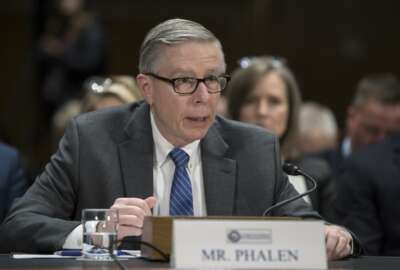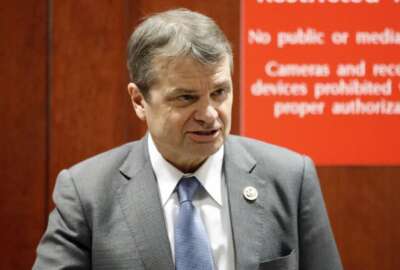
Head of NSA, Cyber Command has ‘classified’ opinion on splitting the roles
The commander of the nation's top cyber security agencies — the National Security Agency and the U.S. Cyber Command — will not confirm that he has recommend...
To listen to the Federal Newscast on your phone or mobile device, subscribe on PodcastOne or Apple Podcasts. The best listening experience on desktop can be found using Chrome, Firefox or Safari.
- The commander of the nation’s top cybersecurity agencies — the National Security Agency and the U.S. Cyber Command — did not confirm that he has recommended the two agencies split from one another next year. Gen. Paul Nakasone disputed a press report that he had recommended to Defense Secretary James Mattis last October that the jobs be separated. But at a House Armed Services Committee hearing on Wednesday, Nakasone declined to say exactly what about the report was inaccurate. He said the details behind his recommendation — whatever it was — are classified. (Defense One)
- The Defense Department appointed Karin Orvis as director of the Defense Suicide Prevention Office. Most recently Orvis served as acting director of Military Community and Family Policy at DoD, responsible for the military quality-of-life program for service members and their families. In 2018, the military services reported 321 suicides among active-duty-members, the highest number since the services began tracking the problem in 2001. (DoD/Military.com)
- A new Defense Department policy will ban transgender troops and recruits from transitioning to another sex while in service. The policy will also require most individuals to serve in their birth gender. The policy comes after a long battle over the ban, which was originally announced by President Donald Trump on Twitter. The order states the military services must implement the policy in the next 30 days. The service secretaries can waive the policy on a case-by-case basis. (Federal News Network)
- The Trump administration gave a big boost to military research and development in its 2020 spending proposal. The White House budget asks for almost $104 billion for Pentagon research, development, testing and evaluation of emerging technologies. That’s about an $8 billion increase over what was approved in 2019. DoD is putting an emphasis on developing technologies that maintain the United States’ military advantage over China and Russia. (Federal News Network)
- The backlog of pending security clearances is down over 25 percent from its record high last April. The National Background Investigations Bureau said it currently has 542,000 pending security clearances, well below the 725,000-case backlog from nearly a year ago. NBIB Director Charlie Phalen said his organization is slowly but surely starting to handle cases more quickly. In January, the average investigation was taking 150 days to complete back in January. That’s significantly faster than the 184 days those cases took a year ago. (Federal News Network)
- A congressional investigation into the decision to keep the FBI headquarters in Washington has begun. House Financial Services and General Government subcommittee chairman Mike Quigley (D-Ill.) said the General Services Administration delivered about 2,500 documents to his office earlier this week. GSA Administrator Emily Murphy told the subcommittee Wednesday that the White House had no involvement in the decision not to move the FBI into new headquarters outside of Washington. But Quigley said the timing of the FBI’s decision raises too many questions about potential involvement by the president. (Federal News Network)
- A Department of Homeland Security executive has told Congress the 2018 midterm elections were secure. Chris Krebs, director of the Cybersecurity and Infrastructure Security Agency, said CISA worked with both federal partners and local election offices. Krebs told the House Appropriations Subcommittee on Homeland Security that CISA provided threat information sharing and cybersecurity expertise. Krebs’ testimony came as the Trump administration seeks $1 billion for DHS cybersecurity activities in fiscal 2020. (House of Representatives)
- Lawmakers and Trump administration officials remain divided over whether rolling back union rights to collective bargaining over compensation would put the Postal Service on firmer financial footing. Sen. Gary Peters (D-Mich.), speaking at a Homeland Security and Governmental Affairs Committee hearing, said reducing collective bargaining power would not help the Postal Service’s financial outlook. Margaret Weichert, the deputy director for management at the Office of Management and Budget, said the ability of the postal unions to collectively bargain for compensation marks a “core difference” from unions who represent federal employees on the General Schedule pay scale. (Federal News Network)
- A bipartisan bill has been introduced in both houses of Congress to reform the Department of Veterans Affairs hiring process. Many VA hospitals continue to experience long wait times and staffing shortages as a result of a lengthy hiring process, and the bill targets the protracted on-boarding process for licensed medical providers. The Veterans Improved Access and Care Act would require the VA Secretary to come up with a strategy to reduce the length of the hiring process by half. (Senate.gov)
- Sen. Marco Rubio (R-Fla.) has introduced two bills to protect small businesses from cyber criminals. The first, the Small Business Administration Cyber Awareness Act, would require the SBA to develop a cyber strategy and report on breaches. The second, the Small Business Cyber Training Act, would institute a cyber training program for small business development centers. (Sen. Marco Rubio)
- Labor Secretary Alexander Acosta created a new chief data officer role and a data board to help the department improve how it manages, uses and make accessible its data. The CDO will be a non-political position in the Office of and reporting to the Assistant Secretary for Policy Jonathan Berry. The CDO will be the chairman of the data board, which will serve as the department’s data enterprise oversight body. In that role, the board will coordinate department-wide efforts around data strategy, data management, standards management and policy execution. (Dept. of Labor)
- Two nominees at DHS are advancing to the Senate floor for a confirmation vote. The Senate Homeland Security and Governmental Affairs Committee favorably reported Ronald Vitiello to be Immigration and Customs Enforcement director, and Joseph Cuffari to be DHS inspector general. DHS has been without a permanent IG for over a year. (Senate HSGAC)
Copyright © 2024 Federal News Network. All rights reserved. This website is not intended for users located within the European Economic Area.
Related Stories
AP/J. Scott Applewhite




